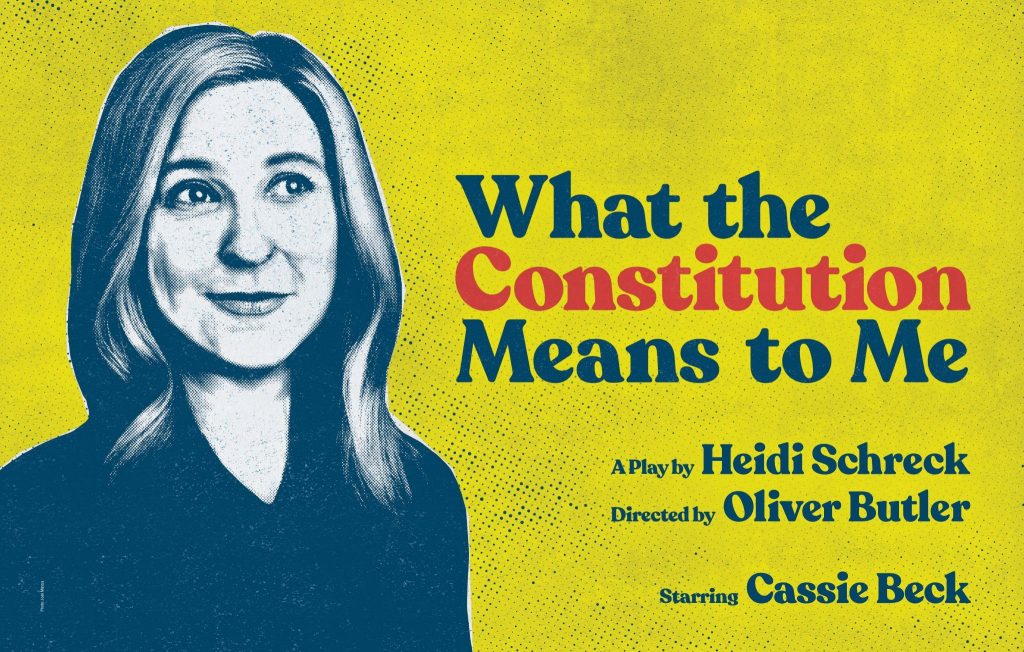
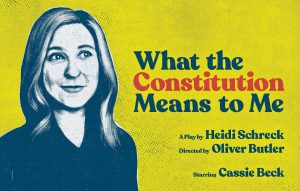 3-1/2 Stars “What the Constitution Means to Me” starts out with a head of steam. What I liked about the show is that it is an autobiographical account of an older Heidi Schrek (playwright and author) who looks back at her life to a younger Heidi (thirty years her junior) with the two of them existing together in one person in real time on stage. The older woman reexamines the younger Heidi’s accomplishments with reference to a more educated, experienced, and wider perspective on life. The key to this show is that Heidi’s understanding of the relationship between herself and the Constitution has shifted with age. We watch how she explains this to the audience by breaking down the fourth wall and getting all of us involved in her story. The performance is at its best when it combines the funny and the serious at the same time, with the character of Heidi constantly addressing the audience. The acting by Cassie Beck, who faithfully plays the main character Heidi, is extremely well done. She is convincing and interesting and holds our attention throughout. It’s almost like watching a one-person show.
3-1/2 Stars “What the Constitution Means to Me” starts out with a head of steam. What I liked about the show is that it is an autobiographical account of an older Heidi Schrek (playwright and author) who looks back at her life to a younger Heidi (thirty years her junior) with the two of them existing together in one person in real time on stage. The older woman reexamines the younger Heidi’s accomplishments with reference to a more educated, experienced, and wider perspective on life. The key to this show is that Heidi’s understanding of the relationship between herself and the Constitution has shifted with age. We watch how she explains this to the audience by breaking down the fourth wall and getting all of us involved in her story. The performance is at its best when it combines the funny and the serious at the same time, with the character of Heidi constantly addressing the audience. The acting by Cassie Beck, who faithfully plays the main character Heidi, is extremely well done. She is convincing and interesting and holds our attention throughout. It’s almost like watching a one-person show.
In real life, Heidi Schrek was born in 1972 and had become an accomplished debater during high school. At age 15, she traveled from her home town of Wenatchee, Washington, throughout the United States, winning debate competitions at American Legion posts. Her great accomplishment was in-depth understanding of the U.S. Constitution and being able to convey to an audience how the Constitution (including the Bill of Rights and subsequent amendments) applied directly to her own life. In so doing, she won enough prize money that she was able to fund her own college education. In contrast, the 45-year-old Heidi is armed not only with a knowledge of the Constitution but with a personal history consisting of stories of domestic violence that her female ancestors had to contend with. Plus, at an earlier point in her adult life, Heidi had to consider whether or not she was going to have an abortion.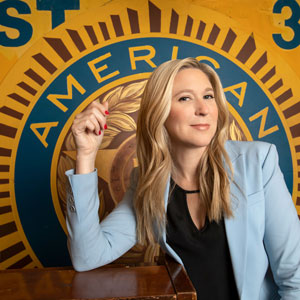
This leads to the political and historical context of the show, which is largely focused on advocacy: the fact that women need to be vigilant in what has become an uphill battle to counteract the seeming erosion of their rights during the last thirty years. One such example is the right to a safe and legal abortion throughout the United States. Heidi explains that abortion is covered within the right to privacy, which has to be inferred from the Ninth Amendment to the Constitution (as elaborated in a recording by Justice Stephen Breyer of the Supreme Court). Other rights, such as the ones that minorities rely on to protect their standing in civil society (e.g., the right to same sex marriage), are also not spelled out in the document and have to be interpreted as being a part of it; this the bane of so-called constitutional Originalists, such as the late Justice Antonin Scalia. Hence a portion of the show is devoted to a debate between an actual 15-year-old student/actor (Emilyn Toffler), who provides the arguments to abolish the existing Constitution and replace it with a more comprehensive and modern document, whereas Heidi argues why we need to keep it and continue to amend it in order to achieve the shared goal of greater inclusiveness and equality for all.
Much of the time, however, we see Heidi debating all by herself with no opponent on stage providing a counterargument Although we can assume in advance that we’re not going to have a strict contest as per the rules of a high school debating society, it gets unrealistic when Heidi starts to exceed the imposed time limits and subsequently interrupts the American Legion debate judge (Mike Iveson). No judge would ever stand for this! But since we are dealing with a theatrical performance, this issue could have been easily resolved by means of better staging: more specifically, by making a clearer distinction between Heidi as the 15-year-old and the 45-year-old. For example, changing the lighting drastically would have helped differentiate the two personas. The lighting could have been flat when the 15-year-old would speak, whereas Beck could have had a spotlight directly on her during her monologues as a 45-year-old. The effect of this is that everything else on stage would fade out, including the debate judge, so that he wouldn’t appear so passive when she would run overtime with her arguments. Besides, Beck could have thrown a scarf around her neck when she played the mature Heidi and removed it when she played the younger woman, or some similar thing.
The structure of the show has its problems too. The constant breaking of character becomes disturbing when it happens too often, and the sequencing is choppy and uneven. The presentation is in four distinct sections: 1) the 15-year-old Heidi versus her 45-year-old self, 2) the character of the American Legion debate judge who becomes a nonbinary character; the point being that they would have likewise been excluded from Constitutional protections, 3) the debate between Heidi and a real teenager about the need to write a brand new Constitution, and 4) the last scene when Heidi and the 15-year-old teen break character and sit back to back, asking each other questions about their lives. This last part is anticlimactic and basically fills up time.
Despite these faults, this show is a thoughtful and interesting case study. It’s not just a story about where you are in life now but where you were in life when you were exposed to certain things. The tale is as much about what the Constitution means to Heidi as it is a portrait of male dominance, female subservience, and cruelty to women over the generations. The story that she weaves about her own family history is an extremely sad one, and I left the show thinking about how lucky I am to be free to make a good number of choices over my own life versus living the life of Heidi’s grandmother or great-grandmother. But I also left with sadness in thinking that women’s rights are not guaranteed in this country. Would they ever be guaranteed, even if the Constitution were overhauled? (Hint: The Equal Rights Amendment was never passed.) Thus there is no clear-cut answer as to whether the fault (if any) lies in federal law versus local laws that are passed by the States and municipalities, as per the Tenth Amendment to the Constitution.
This circumstance begs us to ask, “What kind of government and civil society do the people really want?” Note that while I happen to share Heidi’s political opinions and agree with her sentiments, we currently live in a very divided nation politically and culturally, where a lot of people don’t share the same opinions and values that I do. Perhaps the whole point of the performance, then, is to explain why progressive politics is important to the quest for equality and nondiscrimination. Having said that, some of the politics in this presentation are overdone, and this is not going to change the hearts and minds of audience members who are not already inclined in this direction.
The night of the show, I brought a guest with me who is a pro-life conservative Republican man (almost the complete opposite of myself in political persuasion) so that we could debate the Constitution afterwards. As it turned out, I got more than I had bargained for. “This is left-wing propaganda wrapped up as a character sketch,” he said to me as we were leaving the theatre after the 100-minute performance. While I totally disagreed with him, what kept running through my mind throughout the entire show was that it will play well in New York, Chicago, and Los Angeles, but probably not in Knoxville, Jacksonville, or Boise.
“What the Constitution Means to Me”, directed by Oliver Butler, is a production of Broadway in Chicago, playing through November 7, 2021, at the Broadway Playhouse, 175 E. Chestnut Street, Chicago.
Tickets start at $30; price depends on seat location and performance.
Group tickets for 10 or more can be purchased by emailing Broadway In Chicago Group Sales at groupsales@broadwayinchicago.com.
Tuesday through Friday – 7:30 p.m.
Saturdays – 2:00 and 8:00 p.m.
Sunday, October 31st – 2:00 p.m. only
Sunday, November 7th – 2:00 and 7:30 p.m.
To purchase tickets, visit: https://www.broadwayinchicago.com/show/what-the-constitution-means-to-me-2021/.
For general information about the show, please go to: https://constitutionbroadway.com/.
To see what others are saying, visit www.theatreinchicago.com, go to Review Round-Up and click at “What The Constitution Means To Me”.



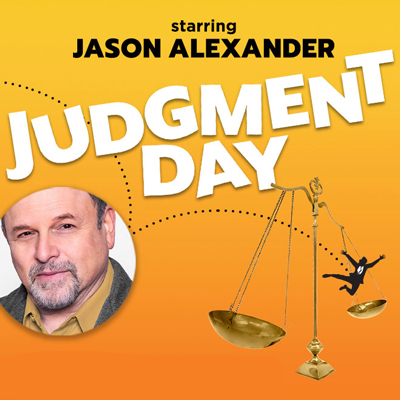

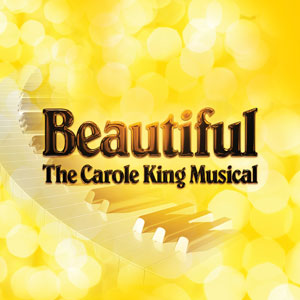
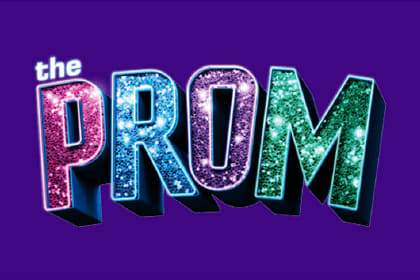
More Stories
“Judgement Day”
“Bluey’s Big Play” reviewed by Tommaso Casati
“Beautiful: The Carole King Musical”